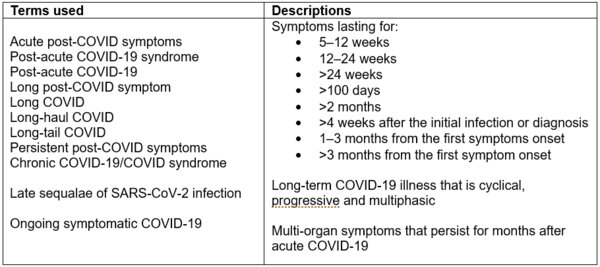How do we define long-COVID-19 disease/post-COVID syndrome?
What the research says:
The definition of post-COVID illness is evolving as our understanding of the clinical picture in the weeks and months after recovery from acute illness advances. Prolonged symptoms lasting for up to 12 weeks have been variously defined as long-COVID or as post-acute COVID symptoms. However, as it is becoming increasingly clear that some patients experience persistent illness beyond 12 weeks and that new symptoms may emerge and others wane and then worsen again, the term post-COVID syndrome (PCS) has also been proposed. PCS is not limited to patients with severe acute COVID-19 illness and may arise in patients following a relatively mild acute infection.
The WHO has provided a working definition of PCS with the understanding that this definition may change as new evidence emerges (WHO 2021):
- “Post COVID-19 condition occurs in individuals with a history of probable or confirmed SARS CoV-2 infection, usually 3 months from the onset of COVID-19 with symptoms and that last for at least 2 months and cannot be explained by an alternative diagnosis. Common symptoms include fatigue, shortness of breath, cognitive dysfunction but also others and generally have an impact on everyday functioning. Symptoms may be new onset following initial recovery from an acute COVID-19 episode or persist from the initial illness. Symptoms may also fluctuate or relapse over time.”
This table highlights the range of definitions used in the literature (Adapted from Yong et al 2021)
Multiple organ systems and over 200 symptoms have been reported following acute COVID-19 illness. The most common symptoms that persist beyond the acute illness are fatigue and dyspnoea. Other persistent symptoms include respiratory symptoms (e.g. cough), psychological symptoms (e.g. anxiety, depression, mood swings), neurologic symptoms (e.g. headache, cognitive and mental impairments), cardiac symptoms (e.g. chest pain, palpitations, dyspnoea), joint and muscle pain, olfactory changes (smell and taste dysfunctions) and gastrointestinal symptoms (Yong et al 2021).
Evidence is evolving on the pathology of PCS. Some of the symptoms may persist due to organ damage acquired during the acute infection, such as:
- Long-term lung damage following acute COVID-19 pneumonia
- Long-term neurological symptoms in patients with severe COVID-19 and delirium
Other long-term symptoms may arise due to unresolved/persistent inflammation, notably myocardial inflammation which may persist even following a mild acute COVID-19 illness (Yong et al 2021).
What this means for your clinical practice:
- Continue to follow-up with patients once they recover from acute COVID-19 illness, with particular vigilance for symptoms persisting beyond 12 weeks from onset of the acute illness.
- Evaluate and consider appropriate referrals for respiratory, psychiatric, cardiovascular or neurological symptoms
Useful links and supporting references:
WHO. A clinical case definition of post-COVID-19 condition by a Delphi consensus, 6 October 2021. Available at: https://www.who.int/publications/i/item/WHO-2019-nCoV-Post_COVID-19_condition-Clinical_case_definition-2021.1. Accessed October 2021.
Yong SJ. Long COVID or post-COVID-19 syndrome: putative pathophysiology, risk factors, and treatments. Infect Dis 2021. Available at: https://doi.org/10.1080/23744235.2021.1924397. Accessed September 2021
Authors:
Dr Fiona Mosgrove (GP and Clinical Lead Grampian Respiratory Improvement Programme, Aberdeen, Scotland, UK) for and on behalf of the IPCRG practice driven answers review group.
Resource information
- COVID-19
- Long COVID

